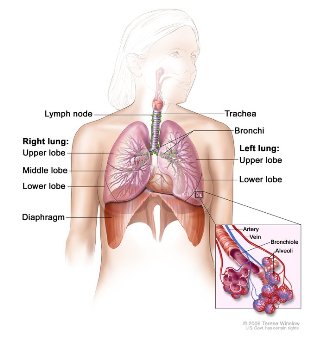Scientists at The University of Nottingham have been involved in the discovery of 16 new sections of the genetic code that relate to lung health — opening up the possibility for better prevention as well as treatment for lung diseases.
An international consortium of 175 scientists from 126 centres in Europe, the USA and Australia identified genetic variants associated with the health of the human lung. Their discovery sheds new light on the molecular basis of lung diseases like Chronic Obstructive Pulmonary Disease (COPD).
It is the first time that these 16 common genetic variants have been definitely linked with lung function. Researchers say the new pathways discovered could be targeted by drugs.
The study was led by Professor Martin Tobin from the University of Leicester, Professor Ian Hall from The University of Nottingham and Dr Stephanie London from the U.S. National Institute of Environmental Health Sciences.
The pioneering research involved a genetic study of 2.5 million genetic variants in each of 48,201 people across the world. A smaller number of the most promising variants were then studied in a further 46,411 individuals.
The research, published in Nature Genetics, was part funded by the East Midlands Healthcare and Bioscience iNet (which is part-financed by the European Regional Development Fund), the UK Medical Research Council (MRC) and the Wellcome Trust.
The recent discoveries build on research published by the same authors last year, bringing the total number of genetic variants associated with lung function to 26. The same authors also showed, in research published in the American Journal of Respiratory and Critical Care Medicine in June 2011, that variants which predict lung function also predict the disease COPD.
Professor Ian Hall, Dean of The University of Nottingham’s Medical School and Professor in Molecular Medicine, said "This work is important because until recently we have not understood the factors which underlie inherited variability in lung function. The very large genetic studies required to identify key genes would not have been possible without the support of many groups around the world and the input of thousands of subjects.
"We now need to take the knowledge gained from this study to do two things: firstly to learn more about the function of genes which contribute to the risk of developing lung diseases such as COPD, and secondly to try and develop strategies to use genetic information to improve the clinical care provided to individual patients."
Professor Martin Tobin, Professor of Genetic Epidemiology and Public Health & MRC Senior Clinical Fellow at the University of Leicester, said: "COPD — a progressive disease that makes it hard for people to breathe — affects around one in 10 adults above the age of 40 and is fourth most common cause of death worldwide.
"Smoking is the most important risk for developing COPD. Smokers are not all equally likely to develop COPD and differences in susceptibility occur due to the genetic variants people carry. For the first time we understand what so many of these genetic variants are, including the underlying mechanisms that they point to. We now need to prioritise research to better understand these disease mechanisms and inform improved patient care.
"These discoveries could provide the key to new therapies for lung diseases such as COPD. It is too early to say whether this information would be of use as a screening test to predict the development of COPD. Stopping smoking is the best way to prevent COPD."





